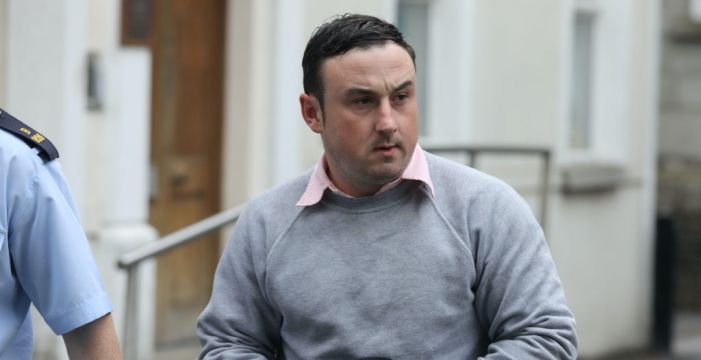The suggestion that two jurors in the trial of Aaron Brady, who was convicted of murdering Detective Garda Adrian Donohoe, may have visited Crossmaglen, Co Armagh after the trial "needed clarification and couldn't be left hanging", the appellant's lawyers have told the Court of Appeal (CoA).
However, Brendan Grehan SC, for the Director of Public Prosecutions (DPP), said the law was "crystal clear" and "the long-established rule" is that a jury cannot be questioned individually or together after their verdict is returned "in relation to anything pertaining to their deliberations".
On the final day of a seven-day hearing before the appellate court, the defence was seeking leave of the court to include the motion as a new ground of appeal.
Father of one Brady, who was jailed in 2020 for a minimum of 40 years for the murder of the detective, is bidding to overturn his conviction before the three-judge appeals court.
Brady's trial was the longest murder case in Irish legal history, lasting 122 court days.
After hearing nearly 50 grounds of appeal submitted by the appellant over the last seven days, in what the Court of Appeal said was "one of the longest ever" matters before it, Mr Justice John Edwards, presiding, sitting with Ms Justice Isobel Kennedy and Ms Justice Tara Burns, said the court would reserve its judgement, remarking that "it was a difficult case for everyone".
Michael O'Higgins SC, representing Brady, submitted on Thursday that a juror had "a random meeting" with a jury minder and "a conversation ensued" where it was relayed that two jury members in the murder trial had travelled north of the Border.
Mr O'Higgins said his solicitor had met the jury keeper on or about March 3rd, 2021m and subsequently by arrangement in the company of junior counsel at the Criminal Courts of Justice Building on June 16th, 2022.
The jury minder confirmed at the later meeting that he had met the juror in the street approximately six weeks after the trial, who informed him that he had gone to Crossmaglen but did not say when he had made that visit.
Counsel said the jury minder's impression was that the visit may have taken place after the trial.
'Crystal clear'
The jury found Brady guilty of the murder of Det Gda Donohoe by majority verdict on August 12th, 2020.
Mr O'Higgins said the defence had written to the prosecution asking that gardaí make the necessary inquiries.
In reply, Mr Grehan said the law is crystal clear that a jury cannot be questioned either as a group or individuals after their verdict in relation to anything pertaining to their deliberations.
"That is the long-established rule, it would have the effect of ending the finality of a jury verdict and go against the well established principle that jury deliberations should not be inquired into," he said.
Mr Grehan said for the defence to infer that gardaí can "go off and take statements" would be in breach of that principle unless "there was a well-founded basis for it".
The barrister said the law operates on the basis that juries follow directions given by a judge, and many directions had been given by the trial judge in the murder trial.
"We don't enquire as to how jury verdicts come about, and a long period of time had been spent by the jury deliberating in this case," he continued.
Mr Grehan said there would have to be "some reasonably well-founded basis" for the verdict in this case to be looked into. "There is a huge disconnect between the ground of appeal put forward in the case and the affidavit that seeks to support it," he said.
Counsel said nothing had happened until the eve of the appeal, "when we are suddenly provided with a letter from the defence saying investigate this".
Mr Grehan said he did not accept there was enough to justify gardaí locating the juror and inviting him to a Garda station to see what he had to say.
Left hanging
The barrister suggested to the three-judge court that if there had been "any reality to their concerns" when Brady's solicitor and counsel spoke to the jury minder on either of the two dates, then the point would have been agitated much earlier.
He submitted that the appellant court should be extremely reluctant to suggest anybody embark on a course that involves jurors being questioned about their deliberations unless there "was a reasonably well-founded and strong evidential basis".
Mr O'Higgins said gardaí and the State have as much interest in "this piece of conversation", which he submitted needed clarification and could not be left hanging.
"I don't understand how the State isn't as anxious [as us] to say why not check out what's been said, but they have opted not to do that," he concluded.
Aaron Brady (32), previously of New Road, Crossmaglen, Co Armagh, is serving a life sentence with a 40-year minimum having been found guilty in 2020 of murdering Detective Garda Adrian Donohoe (41) at Lordship Credit Union in Bellurgen, Co Louth on January 25th, 2013.
Brady was also sentenced to 14 years for the robbery, a sentence that will run concurrently with the life sentence.
Det Gda Donohoe was on a cash escort when he was ambushed by a five-man gang and shot dead. The raiders stole €7,000 in cash during the robbery, which lasted 58 seconds.
Brady was sentenced to the mandatory term for murder of life imprisonment in October 2020. As he had been found guilty of murdering a garda acting in accordance with his duty, the trial judge ordered that he serve a minimum of 40 years.







